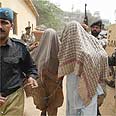
Khalid Sheikh Mohammed said Thursday that he would welcome the death penalty for his confessed role as mastermind of the Sept. 11 terrorist attacks. "Yes, this is what I wish, to be a martyr for a long time,"
Mohammed told a military judge who warned that he faces execution if convicted of organizing the attacks on America. "I will, God willing, have this, by you."
The former No. 3 leader of al-Qaeda and four alleged co-conspirators were being arraigned Thursday in their long-awaited first appearance before a war-crimes tribunal.
All five face death if convicted of war crimes including murder, conspiracy, attacking civilians and terrorism in the 2001 attacks, which killed 2,973 people.
Appearing calm as he propped his glasses on his turban to peer at legal papers, Mohammed also grinned and exchanged a few words with someone at the defense table occupied by Waleed bin Attash, who allegedly selected and trained some of the 19 hijackers who turned airplanes into missiles in the attacks.
The arraignment of the alleged al-Qaeda co-conspirators begins the highest-profile test yet of the military's tribunal system, which faces an uncertain future. The Supreme Court is to rule this month on the rights of Guantanamo prisoners, potentially delaying or halting the proceedings.
Mohammed's first public appearance since 2003
It also carries some strategic risk. The military is trying to minimize the chance that Mohammed will be able to spread al-Qaeda propaganda in courtroom speeches. The judge, Marine Col. Ralph Kohlmann, announced a 20-second delay in the closed-circuit video feed to prevent classified information from being disclosed outside the courtroom.
It is the first public appearance for Mohammed since his capture in Pakistan in 2003. He was held in CIA custody at secret sites and then transferred to the US Navy base in Guantanamo Bay, Cuba, in 2006, where the exact location of his cell is also top-secret.
Mohammed's defense team has said he may have suffered cognitive impairment from harsh interrogations in CIA custody.
The Supreme Court struck down the commissions as unconstitutional in 2006. Congress then altered and resurrected them, but they have remained mired in confusion over courtroom rules, dogged by delays, and challenged repeatedly as unconstitutional.
Military expects arraignment to last just one day
With less than eight months remaining in US President George W. Bush's term, presidential candidates Barack Obama and John McCain both say they want to close the military's offshore detention center.
Obama opposed the Military Commissions Act that in 2006 resurrected the military commissions, but McCain supported it.
The military expects the joint arraignment of the five to last just one day. The prisoners will be formally notified of the nature of the charges, will be told of their rights to attorneys and will be given the opportunity to enter a plea, though they do not have to enter one.
The other defendants are: Ramzi Binalshibh, said to have been the main intermediary between the hijackers and al-Qaeda leaders; Ali Abd al-Aziz Ali, known as Ammar al-Baluchi, a nephew and lieutenant of Mohammed; al-Baluchi's assistant, Mustafa Ahmad al-Hawsawi.















